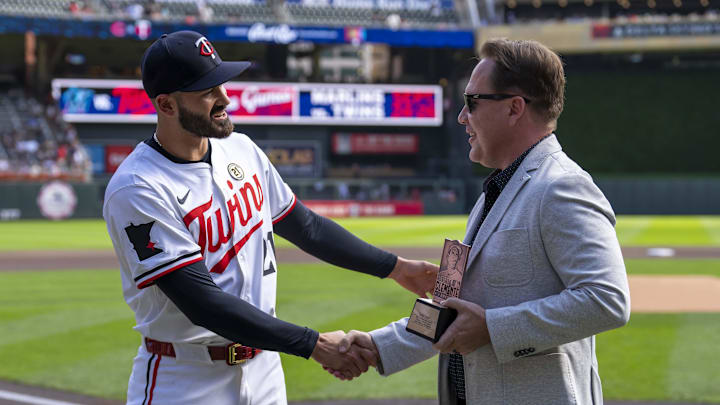Recap: How the front office rating works
This is one in a series of assessments of the performances of front offices for the 2024 season. Each front office is given a score based on the total Wins Above Average of the players they either traded for, signed via free agency or extension, or promoted from their farm system, since the conclusion of the 2023 postseason.
A front office’s score also includes the total Wins Above Average of players traded away or lost to free agency since the end of the 2023 postseason. The front offices are being presented in order of their total value from No. 30 (worst) all the way to No. 1 (best).
These ratings do not necessarily reflect the final standings. Front offices are measured based only on the talent they acquired or lost during the past 12 months. Players on multi-year contracts, or already under team control, don’t count toward this rating.
11. Minnesota Twins, Derek Falvey, president of baseball operations, Thad Levine, senior vice president and general manager, +2.9
Of all 30 front office ratings for 2024, the Twins’ rating is the most subject to second-guessing.
Part of the rating formula involves the impact of players lost to other organizations. If Shohei Ohtani signs across town, that’s a big plus for the Dodgers but it’s also a debit against the Angels because, let’s face it, losing Ohtani hurts.
It’s rare when the reverse happens: when a team surrenders a player who joins another team and then runs up very negative numbers, in the process of enhancing the score of the team that let him go. After all, players who perform poorly tend not to last very long.
But in 2024, Derek Falvey and Thad Levine got out from under what turned out to be the two worst acquisitions in all of Major League Baseball. First, they cut Kenta Maeda, who signed with Detroit and delivered a -2.7 WAA for the Tigers. Then, in February, they traded Nick Gordon to Miami for Steve Okert. Gordon laid a -2.6 WAA egg on the Marlins.
Dumping those two players alone thus improved the Twins front office score to the +2.9 it is from the -2.7 it otherwise would have been.
Overall, the Falvey-Levine front office made moves impacting 41 major leaguers, with 20 of those moves working to Minnesota’s favor against just 14 negative impacts and seven neutral.
Five most impactful Falvey-Levine moves

Transaction | Net Impact (Wins Above Average) |
|---|---|
Released Kenta Maeda to free agency | +2.7 |
Traded Nick Gordon to Miami | +2.6 |
Acquired Manuel Margot in a trade with the Dodgers | -1.8 |
Promoted rookie Austin Martin | -1.6 |
Signed free agent Jay Jackson | -1.1 |
So, why did the Twins finish fourth and out of the playoffs in the AL Central? Because only nine of those 20 positive transactions involved players who actually competed for the Twins in 2024, and none of those nine yielded a benefit greater than Pablo Lopez’s +0.9 games. The Twins gave Lopez a four-year extension prior to the season’s start.
For those opting to look at the bright side, let the record show that Falvey and Levine did promote rookie pitcher Simeon Woods-Richardson, who may develop into the staff ace. In his debut, Woods-Richardson made 28 starts with a 4.17 ERA in 134 innings. He’s hanging with Lopez and Joe Ryan atop the winter depth chart.
But the reality is that Falvey and Levine had a far better record dumping players than snagging them. The list of ex-Twins infesting somebody else’s roster in 2024 included Maeda and Gordon along with Joey Gallo, Nike Goodrum, and Dallas Keuchel.
The problem is you can’t build a winner by taking out the trash. The Twins were good at that, but far less effective at collecting quality talent.
Previous Rankings:
11. Minnesota Twins, Derek Falvey, president of baseball operations, Thad Levine, senior vice president and general manager, +2.9
Next: 10. New York Yankees, Brian Cashman, senior vice president and general manager, +3.0
